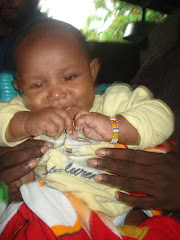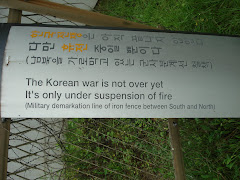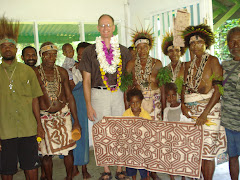Wednesday, July 7, 2010
A Clean Sweep
People do their best. Over and over again, I have to acknowledge this personal effort. Yesterday as I walked to "downtown" Port Moresby I passed a dozen men and women sweeping the streets and sidewalks with a clutch of straws. Men cutting grass with weed whackers. Throughout the city large black plastic bags bulging with garbage waited alongside the roads; occasionally they get picked up by city crews. Frustrated by the proliferation of rubbish, people sweep it into piles and burn it. The acrid smoke of burning garbage and clouds of dust from the crumbling roads make me sneeze and cough. I have to keep my eyes down, because sidewalks and pathways often are missing metal covers for sewers and utility holes. Sometimes the pavement has been broken to repair a water or electricity line (you can see the trench both sides of the walk way) but lack of funds to repave the place means in time the gravel filler erodes and there is a trap for the unwary. Public spaces invite public use: parks have been built but no money has been spent refurbishing as the moveable parts wear out or benches and equipment succumb to heavy use or suffer vandalism. So an old woman sweeps fastidiously around a metal spur that sticks out of the ground, obviously once part of the foundation for a park bench. The city has grown too rapidly to absorb the effluent that is produced by thousands of people; someplaces there are no sewers, other places the PVC sewage lines are broken, in someplaces I am sure the problem is due to older, discredited strategies for disposing of waste i.e. pumping into the sea: whatever the reason, there are warning signs about fecal coliform posted on Ela Beach next to downtown. The tide also brings an unmanageable load of plastic bags and other rubbish.
There is an urgent need for housing. People come to the city and move in with relatives, then build a small shelter behind the relatives' home. So many people living in small spaces mean that there is a gradual disintegration: windows get broken, doors sag, roofs leak, appliances wear out, plumbing breaks down. So the old appliances are shifted outside, tarps are put over the leaky roofs, extension lines get electricity to new structures, and hoses share water among neighbors. Everywhere the old women are sweeping, burning rubbish, sitting alongside the road to sell betel nut and cigarettes. But where is the money for housing and public works to come from? Citizens pay a sales tax, but no income tax. Most land is under customary ownership. The government seems to depend on aid from overseas: I spotted a sign saying a park had been built by the Chinese government, a hospital supported by the Australian government. No big tax base. With mining, timber and fisheries, the contracts are often with overseas companies, or the income from these industries does not provide sufficient national income to repair the infrastructure.
Some people have obviously made it. Large Land Cruisers roar along the pitted roads, swirling the dust. A handful of tall buildings rise out of the downtown area, armed guards glaring at the barefoot people who mill around in the streets. The national newspaper has advertisments for luxury housing, promising high fences and security guards, and praising the joys of swimming pools and airconditioning to a reading public most of whom squat on the sidewalks. I asked the brothers and their friends: "Where do all the rich people live?" One fellow laughed and said, "I've lived in Moresby for three years and never seen where the rich people live. Its all shit wherever you look." Good news for anonymous rich folks who don't want hungry hordes pulling the barbed wire down. Probably they all live in Australia. I got my haircut and as the barber and I were chatting, I asked if he owned the shop. "Oh no!" he laughed. "The owner lives in Cairns and just flies up once in a while to check on the business."
The brothers get one TV station with their rabbit ear antenna. It is the national TV station called EMTV. Every few minutes a pair of ads crops up, one for Coca Cola and the other for Digicel, a cell phone company. You'd think Papua New Guinea invented Coke, and if you drink enough of it you will get the car, the girl, the house and the laptop. I think advertising is ridiculous in America, but with a larger middle class the promises of the ads seems less shocking than here in PNG. Buy Coke and live the "Coca Cola" lifestyle. Judging from the millions of coke cans and plastic bottles everywhere on beaches and along the roadsides, the message is getting through--the promised joys must be in the NEXT can. At least cholera hasn't fizzed out of the cans yet as it has the taps in some of the poorest neighborhoods. Digicel has everybody "topping up" and staying connected. Everyday people buy these tiny sums of "time" for their cell phones. People love their cell phones as much here as anywhere. But all that connectivity seems like fools gold, the only ones seeming to profit is Digicel. It is possible to get rich here, you just have to get a large number of people to believe that what you have will benefit them somehow. So now brothers can call home to their villages or catch up with relatives in town. This is a great good; but the effort of keeping the phone going chisels away at the food budget. Its a balancing act. People do their best.
It is easy to carp about the terrible conditions: I could go on for pages about the calamitous condition of the local school: floor boards, walls, ceilings missing, no running water or electricity, no paths or stairs to help students scramble from building to builing on the precipitous site. It makes me angry that students here have to suffer such conditions. It is not just here: I have seen similar conditions in South Africa and Solomon Islands. I have read about places all over the globe where there is desperate poverty. I am not naive about the dereliction in USA; I haven't worked with the homeless in America for nearly 25 years and preserved my illusions from a privileged upbringing.
The thing that enrages me is that it is possible to sell a product to steal a fortune from a country a penny at a time. It is possible to create a beautiful lifestyle wherever: all you need are guns to keep it safe. And somehow it is all okay. We sweep around the wrecks, we press school uniforms, doing our best with what we can control. Here in PNG the government erects large bill boards promising a crackdown on corruption: probably an indication of thoroughgoing governmental corruption from top to bottom. Somehow we need to go beyond bill boards and mobilize the sweepers not just to tidy up but to clean out the whole system.
Cell phones are subversive in Iran. It's surprising the use you can put things to if you think about it.
I've seen the impact of collective action in holding corrupt officials accountable. I've watched things happen around the world in the last 25 years because people stood up to tanks, walls, violent oppression. Somehow enough people caught a glimpse of something better and were willing to pay the cost to move things forward. Some political leaders have suffered house arrest for decades because of their stand against oppression. The Buddhist monks of Burma have taken to the streets.
Next week I will be in the Solomon Islands with a small group of Society of St. Francis brothers and sisters from around the world and we will consider how to be peacemakers in the world, oppression shakers, violence disturbers. And we will bring it home to PNG, Solomon Islands, Sri Lanka, Zimbabwe, South Korea, USA, Britain, Brazil, Australia and New Zealand. At the same time plans are progressing for a November program to train over 200 brothers in sisters in the Solomon Islands on how to develop a social justice ministry. Perhaps the word will go out. Burmese monks and Anglican friars and sisters!
We have to do the best we can with what we have: each other. We have to do our best with the dreams inspired by the Holy Spirit for justice, peace, shalom.
There is an urgent need for housing. People come to the city and move in with relatives, then build a small shelter behind the relatives' home. So many people living in small spaces mean that there is a gradual disintegration: windows get broken, doors sag, roofs leak, appliances wear out, plumbing breaks down. So the old appliances are shifted outside, tarps are put over the leaky roofs, extension lines get electricity to new structures, and hoses share water among neighbors. Everywhere the old women are sweeping, burning rubbish, sitting alongside the road to sell betel nut and cigarettes. But where is the money for housing and public works to come from? Citizens pay a sales tax, but no income tax. Most land is under customary ownership. The government seems to depend on aid from overseas: I spotted a sign saying a park had been built by the Chinese government, a hospital supported by the Australian government. No big tax base. With mining, timber and fisheries, the contracts are often with overseas companies, or the income from these industries does not provide sufficient national income to repair the infrastructure.
Some people have obviously made it. Large Land Cruisers roar along the pitted roads, swirling the dust. A handful of tall buildings rise out of the downtown area, armed guards glaring at the barefoot people who mill around in the streets. The national newspaper has advertisments for luxury housing, promising high fences and security guards, and praising the joys of swimming pools and airconditioning to a reading public most of whom squat on the sidewalks. I asked the brothers and their friends: "Where do all the rich people live?" One fellow laughed and said, "I've lived in Moresby for three years and never seen where the rich people live. Its all shit wherever you look." Good news for anonymous rich folks who don't want hungry hordes pulling the barbed wire down. Probably they all live in Australia. I got my haircut and as the barber and I were chatting, I asked if he owned the shop. "Oh no!" he laughed. "The owner lives in Cairns and just flies up once in a while to check on the business."
The brothers get one TV station with their rabbit ear antenna. It is the national TV station called EMTV. Every few minutes a pair of ads crops up, one for Coca Cola and the other for Digicel, a cell phone company. You'd think Papua New Guinea invented Coke, and if you drink enough of it you will get the car, the girl, the house and the laptop. I think advertising is ridiculous in America, but with a larger middle class the promises of the ads seems less shocking than here in PNG. Buy Coke and live the "Coca Cola" lifestyle. Judging from the millions of coke cans and plastic bottles everywhere on beaches and along the roadsides, the message is getting through--the promised joys must be in the NEXT can. At least cholera hasn't fizzed out of the cans yet as it has the taps in some of the poorest neighborhoods. Digicel has everybody "topping up" and staying connected. Everyday people buy these tiny sums of "time" for their cell phones. People love their cell phones as much here as anywhere. But all that connectivity seems like fools gold, the only ones seeming to profit is Digicel. It is possible to get rich here, you just have to get a large number of people to believe that what you have will benefit them somehow. So now brothers can call home to their villages or catch up with relatives in town. This is a great good; but the effort of keeping the phone going chisels away at the food budget. Its a balancing act. People do their best.
It is easy to carp about the terrible conditions: I could go on for pages about the calamitous condition of the local school: floor boards, walls, ceilings missing, no running water or electricity, no paths or stairs to help students scramble from building to builing on the precipitous site. It makes me angry that students here have to suffer such conditions. It is not just here: I have seen similar conditions in South Africa and Solomon Islands. I have read about places all over the globe where there is desperate poverty. I am not naive about the dereliction in USA; I haven't worked with the homeless in America for nearly 25 years and preserved my illusions from a privileged upbringing.
The thing that enrages me is that it is possible to sell a product to steal a fortune from a country a penny at a time. It is possible to create a beautiful lifestyle wherever: all you need are guns to keep it safe. And somehow it is all okay. We sweep around the wrecks, we press school uniforms, doing our best with what we can control. Here in PNG the government erects large bill boards promising a crackdown on corruption: probably an indication of thoroughgoing governmental corruption from top to bottom. Somehow we need to go beyond bill boards and mobilize the sweepers not just to tidy up but to clean out the whole system.
Cell phones are subversive in Iran. It's surprising the use you can put things to if you think about it.
I've seen the impact of collective action in holding corrupt officials accountable. I've watched things happen around the world in the last 25 years because people stood up to tanks, walls, violent oppression. Somehow enough people caught a glimpse of something better and were willing to pay the cost to move things forward. Some political leaders have suffered house arrest for decades because of their stand against oppression. The Buddhist monks of Burma have taken to the streets.
Next week I will be in the Solomon Islands with a small group of Society of St. Francis brothers and sisters from around the world and we will consider how to be peacemakers in the world, oppression shakers, violence disturbers. And we will bring it home to PNG, Solomon Islands, Sri Lanka, Zimbabwe, South Korea, USA, Britain, Brazil, Australia and New Zealand. At the same time plans are progressing for a November program to train over 200 brothers in sisters in the Solomon Islands on how to develop a social justice ministry. Perhaps the word will go out. Burmese monks and Anglican friars and sisters!
We have to do the best we can with what we have: each other. We have to do our best with the dreams inspired by the Holy Spirit for justice, peace, shalom.
Subscribe to:
Post Comments (Atom)






No comments:
Post a Comment